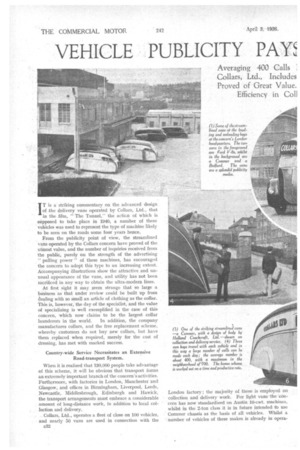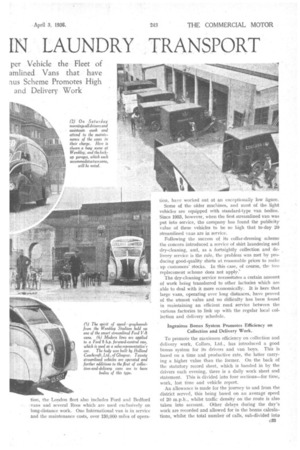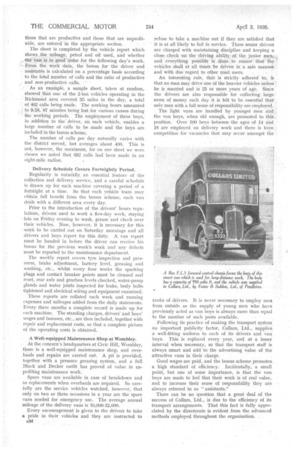VEHICLE PUBLICITY PAY IN LAUNDRY TRANSPORT
Page 54

Page 55

Page 56

If you've noticed an error in this article please click here to report it so we can fix it.
IT is a striking commentary on the advanced design of the delivery vans operated by Collars, Ltd., that in the film, "The Tunnel," the action of which is supposed to take place in 1940, a number of these vehicles was used to represent the type of machine likely to be seen on the roads some four years hence.
From the publicity point of view, the streamlined vans operated by the Collars concern have proved of the utmost value, and the number of inquiries received from the public, purely on the strength of the advertising " pulling power" of these machines, has encouraged the concern to adopt this type to an increasing extent. Accompanying illustrations show the attractive and unusual appearance of the vans, and utility has not been sacrificed in any way to obtain the ultra-modern lines.
At first sight it may seem strange that so large a business as that under review could be built up from dealing with so small an article of clothing as the collar. This is, however, the day of the specialist, and the value of specializing is well exemplified in the case of this concern, which now claims to be the largest collar launderers in the world. In addition, the company manufactures collars, and the free replacement scheme, whereby customers do not buy new collars, but have them replaced when required, merely for the cost of dressing, has met with marked success.
Country-wide Service Necessitates an Extensive Road-transport System.
When it is realized that 130,000 people take advantage of this scheme, it will be obvious that transport forms an extremely important branch of the concern's activities. Furthermore, with factories in London, Manchester and Glasgow, and offices in Birmingham, Liverpool, Leeds, Newcastle, Middlesbrough, Edinburgh and Hawick, the transport arrangements must embrace a considerable amount of long-distance work, in addition to local collection and delivery.
Collars, Ltd., operates a fleet of close on 100 vehicles, and nearly 50 vans are used in connection with the c32 tion, have worked out at an exceptionally low figure.
Some of the older machines, and most of the light vehicles are equipped with standard-type van bodies. Since 1933, however, when the first streamlined van was put into service, the company has found the publicity value of these vehicles to be so high that to-day 20 streamlined vans are in service.
Following the success of its collar-dressing scheme the concern introduced a service of shirt laundering and dry-cleaning, and, as a fortnightly collection and delivery service is the rule, the problem was met by producing good-quality shirts at reasonable prices to make up customers' stocks. In this case, of course, the free replacement scheme does not apply.'
The dry-cleaning service necessitates a certain amount of work being transferred to other factories which are able to deal with it more economically. It is here that large vans, operating over long distances, have proved of the utmost value and no difficulty has been found in maintaining an efficient road service between the various factories to link up with the regular local collection and delivery schedule.
Ingenious Bonus System Promotes Efficiency on Collection and Delivery Work.
To promote the maximum efficiency on collection and delivery work, Collars, Ltd., has introduced a good bbnus system for its drivers and van boys. This is based on a time and productive rate, the latter carrying a higher value than the former. On the back of the statutory record sheet, which is handed in by the drivers each evening, there is a daily work sheet and statement. This is divided into four sections—for time, work, lost time and vehicle report.
An allowance is made for the journey to and from the district served, this being based on an average speed of 20 m.p.h., whilst traffic densitl. on the route is also taken into account. Other delays during the day's work are recorded and allowed for in the bonus calculations, whilst the total number of calls, sub-divided into
those that are productive and those that are unprofitable, are entered in the appropriate section.
The sheet is completed by the vehicle report which shows the mileage, petrol and oil used, and whether the van is in good order for the following day's work. From the work data, the bonus for the driver and assistants is calculated on a percentage basis according to the total number of calls and the ratio of productive and non-productive calls.
As an example, a sample sheet, taken at random, showed that one of the 2-ton vehicles operating in the Richmond area covered 35 miles in the day, a total of 462 calls being made. The working hours amounted . to 9.58, 87 minutes being lost for various causes during the _working periods. The employment of three boys, in addition to the driver, on each vehicle, enables a large number of calls to be made and the boys are included in the bonus scheme.
The number of calls per day naturally varies with the district served, but averages about 400. This is not, however, the maximum, for on one sheet we were shown we noted that 692 calls had been made in an eight-mile radius.
Delivery Schedule Covers Fortnightly Period.
Regularity is natufally an essential feature of the collection and delivery service, and a careful schedule is drawn up for each machine covering a period of a fortnight at a time. So that each vehicle team may obtain full benefit from the bonus scheme, each van deals with a different area every day.
Prior to the introduction of the drivers' hours regulations, drivers used to work a five-day week, staying late on Friday evening to wash, grease and check over their vehicles. Now, however, it is necessary for this work to be carried out on Saturday mornings and all drivers and boys report for this duty. A van report must be handed in before the driver can receive his bonus for the previoes week's work and any defects must be reported to the maintenance department.
The weekly report covers tyre inspection and pressures, brake adjustment, battery level, greasing and washing, etc„ whilst every four weeks the sparking plugs and contact breaker points must be cleaned and reset, rear axle and gearbox levels checked, water-pump glands and Water joints inspected for leaks, body bolts tightened and electrical wiring and equipment examined.
These reports are collated each week and running expenses and mileages added from the daily statements. Every three months a complete record is made up for each machine. The standing charges, drivers' and boys' wages and bonuses, etc., are then included, together with repair and replacement costs, so that a complete picture of the operating costs is obtained.
A Well-equipped Maintenance Shop at Wembley.
At the concern's headquarters at Civic Hill, Wembley, there is a well-equipped maintenance shop, and overhauls and repairs are carried out. A pit is provided, together with a pressure greasing system, and a full Black and Decker outfit has proved of value in expediting maintenance work.
Spare vans are available in case of breakdown and as replacements when overhauls are required. So carefully are the service vehicles watched, however, that only on two or three occasions in a year are the spare vans needed for emergency use. The average annual mileage of the delivery vans is 10,000-12,000.
Every encouragement is given to the drivers to take a pride in their vehicles and they are instructed to c34 refuse to take a machine out if they are satisfied that it is at all likely to fail in service. Three senior drivers are charged with maintaining discipline and keeping a close check on the driving ability of the junior men, and everything possible is done to ensure that the vehicles shall at all times be driven in a safe manner and with due regard to other road users.
An interesting rule, that is strictly adhered to, is that no man may drive one of the heavier vehicles unless ' he is married and is 23 or more years of age. Since the drivers are also responsible for collecting large sums of money each day it is felt to be essential that only men with a full sense of responsibility are employed.
The light vans are handled by younger men and the van boys, when old enough, are promoted to this position. Over 100 boys-between. the ages of 14 and 18 are employed on delivery work and there is keen competition for vacancies that may occur amongst the ranks of drivers. It is never necessary to employ men from outside as the supply of young men who have previously acted as van boys is always more than equal to the number of such posts available.
Following its practice of making the transport system an important publicity factor, Collars, Ltd., supplies a well-fitting uniform to each of its drivers and van boys. This is replaced every year, and at a lesser interval when necessary, so that the transport staff is always smart and add to the advertising value of the attractive vans in their charge.
Good wages are paid, and the bonus scheme promotes a high standard of efficiency. Incidentally, a small point, but one of some importance, is that the van boys are made to feel that their work is of real value, and to increase their sense of responsibility they are always referred to as "assistants."
There can be no question that a great deal of the success of Collars, Ltd., is due to the efficiency of its transport arrangements. That this fact is fully appreciated by the directorate is evident from the advanced methods employed throughout the organization.












































































































